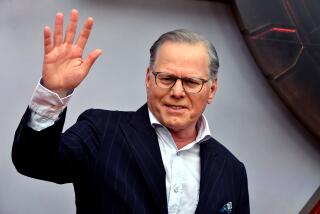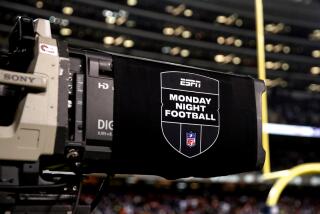Verizon makes serious play for entertainment, but will the wireless carrier succeed?
The makers of the new sports mockumentary series “The 5th Quarter” wanted to create a show tailored to the viewing habits of young mobile phone viewers — short episodes under 15 minutes, standalone plot lines that can be viewed in any order and plenty of famous faces such as the Los Angeles Clippers’ Blake Griffin and the Lakers’ Metta World Peace to fill the small screen.
In looking to team up with a youth-oriented distribution channel, the series is making an unusual bet on Verizon Communications Inc., the broadband and wireless behemoth not known for its hip cachet among millennials.
“My goal was to find a nontraditional platform,” said Michael Ratner, the series creator. He was convinced that Verizon’s Go90 mobile streaming app was the right fit because of its strength in sports programming. “We’re targeting that fan.”
With all eyes on AT&T Inc.’s $85.4-billion acquisition of Time Warner Inc, Verizon has been mounting its own far-more-modest media offensive, which has so far focused on ad-supported content. The New York telecom giant is betting that initiatives such as Go90, its acquisition of Yahoo and Aol and investments in various start-ups including AwesomenessTV and Complex will create new growth as its core business slows.
But some industry analysts are skeptical that a wireless carrier with virtually no experience in entertainment will succeed. Much of the concern surrounds its $4.8-billion Yahoo buy, which has been clouded by a recent data breach and worries that it won’t bring the new viewers Verizon craves.
Wireless carriers such as AT&T are confronting a slowdown in subscription growth, prompting them to find new ways to grow their business. Verizon’s entertainment foray, however, is off to a shaky start. The flagship streaming service, Go90, has been struggling. “It’s not working,” said James Min, a founding partner at Santa Monica investment bank Telos Advisors. “It’s not providing a meaningful audience.”
Verizon executives argue that such skepticism is premature because the media play is so new.
“We’re getting started, we’re getting all the pieces in place,” said Chip Canter, who was hired this year from NBCUniversal to head the company’s digital entertainment division. He said mobile viewing remains a priority for Verizon.
“Go90 is a first position and we’ll expand it,” Canter said. “We’ll look to explore other models — like subscription. So hopefully we’ll see a portfolio of products that service different audience segments.”
When it launched a year ago, Go90 had early technical issues and other initiatives have so far had a muted impact on the market, but “it’s early days,” said Craig Moffett, an analyst at MoffettNathanson. “Verizon has deep pockets.”
In an investor call this year, Verizon Chief Financial Officer Fran Shammo estimated that it would take at least another two years for the ad-supported Go90 to turn a profit. “Right now we’re focused on viewership, not necessarily the profitability of the product,” he said.
Verizon would not disclose results or financials for Go90, but a spokesman said the company is “very pleased” with the number of downloads and users, noting viewers spend an average of more than 30 minutes on the app.
Some observers believe that Verizon might eventually buy CBS and Viacom to bulk up in a similar way that AT&T is trying to do with its acquisition of Time Warner.
But Verizon has said that the AT&T-Time Warner deal doesn’t affect its focus on attracting millennials and teenagers to smartphone apps filled with articles and short shows.
“They are going after a market that exists today. We are going after where the market is headed,” Marni Walden, the Verizon executive in charge of leading the new efforts, said at a conference Wednesday. “We’re focused on short, episodic content — seven, eight minutes. We’re not going out to make ‘Game of Thrones.’”
“There is no plausible reason for Verizon to follow suit,” Moffett said. “Verizon’s strategy in content seems to be overtly in support of their wireless business. AT&T’s seems to be diversifying away from its wireless business.”
Verizon’s bid for Yahoo was driven by its desire to build its foothold in digital content and advertising. Despite the hack, Verizon executives say they expect to close on the acquisition next year.
Wall Street, however, has reacted coolly to the deal, citing the tech giant’s long-standing struggles.
“Buying Yahoo doesn’t get them millennials as much as they want,” Min said.
At a recent UCLA class of 70 students, only six people raised their hands when asked what Yahoo services they use, he said, “and those were all for fantasy sports and Yahoo Finance,” not for entertainment.
Meanwhile, the country’s largest wireless carrier has been poaching talent from the media world as it ramps up its content offerings. It recently hired a former YouTube executive to serve as chief content officer for Go90.
Verizon has also hired two TV veterans to spearhead what will be a new subscription streaming service in collaboration with AwesomenessTV: Samie Kim Falvey, a former comedy development executive at ABC, and Russell Rothberg, a former drama executive at Universal Television.
Verizon acquired a 24.5% stake in AwesomenessTV this year for about $159 million with the intent of launching the streaming service, which would exist as part of Go90. The L.A. production company, which is majority held by DreamWorks Animation, is among the more popular players in an increasingly cluttered mobile-content space in which competitors jockey for teen and millennial viewers.
Some of AwesomenessTV’s shows are already available on Go90, such as the high-school drama series “Guidance.”
Verizon’s competitive advantage remains its ad technology, especially its ability to deliver ads that target user interests and circumvent ad blocking.
“We can provide more targeted ads and more relevant ads, which keeps viewing times longer,” said Joseph Hopkins, a vice president at the company’s digital media services group. “It’s a better experience for the publisher and end user.”
Last year’s $4.4-billion acquisition of AOL bolstered Verizon’s ad capabilities and media holdings, bringing into its portfolio websites including the Huffington Post and TechCrunch. Verizon hopes the AOL properties will complement Yahoo apps such as Tumblr and Mail. But it remains unclear how much headway the pairing can make in ad-supported digital media, where advertisers spend about 70 to 80 cents of every $1 through the systems of either Google or Facebook.
Meanwhile, Verizon continues to make small, strategic acquisitions and partnerships in the media space. This week, it snapped up Vessel, a San Francisco-based online video start-up headed by former Hulu CEO Jason Kilar. Verizon will use Vessel’s technology but will shut down its consumer video service.
“What we’re trying to do is marry digital video with connectivity,” said Canter, of Verizon’s entertainment group. “We have all these assets and we’re just getting started activating them.”
Twitter: @DavidNgLAT
ALSO
Former head of failed Hollywood payroll firm convicted of tax fraud
Google parent Alphabet rakes in profit, and YouTube is one of its rising stars
NBC taps Jennifer Lopez for next musical production, ‘Bye Bye Birdie Live!’
More to Read
From the Oscars to the Emmys.
Get the Envelope newsletter for exclusive awards season coverage, behind-the-scenes stories from the Envelope podcast and columnist Glenn Whipp’s must-read analysis.
You may occasionally receive promotional content from the Los Angeles Times.









